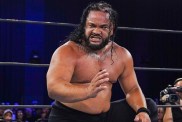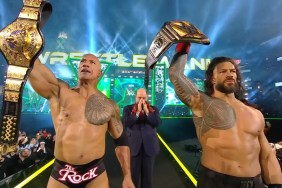It’s no secret that WWE’s schedule is absolute insanity to the common person. Superstars may be living their dreams on the big stage, enjoying the glitz and glamor that the sold-out arenas, camera, pyro and everything else brings, but in reality, it’s a lot more different than one might think.
In fact, while it’s easy to compare it to a sports schedule, in reality, it’s quite different, and in many ways, much more difficult as well. For one, WWE superstars are on the road for 52 weeks a year, traveling from town to town for live vents, TV tapings, and a few times a year, international tours as well.
It’s absolutely crazy to think that in the midst of this hectic schedule, not only do they work out every day and keep their bodies in shape, but they eat healthily and they do all sorts of media obligations as well. It’s far from easy. It requires all the sacrifice, blood, sweat and tears. When you look at some superstars in hindsight, it’s nothing short of amazing as to how they managed to pull it all off.
Dean Ambrose, for example, went years and years wrestling night in and night out for WWE without facing any injuries, any illness, having essentially zero days off. He was rightfully dubbed as the “Iron man of WWE” in the year 2016, and during his WWE title reign, there was even one point where he wrestled in two different live events in one night.
Seth Rollins had appeared for every single RAW from his debut in 2012 till his injury in November 2015. Ever wondered why he’s called Monday Night Rollins? And then you have a megastar like John Cena. Being the franchise player is a whole different ballgame altogether. You not only have to appear week in and week out, but you’re essentially the top draw for television and live events.
On top of that, it comes with more media obligations, a lot of “Make a Wish” grants, and more. Cena ended up setting the record for the number of “Make a Wish” wishes that he granted, and through it all, he suffered injuries and came back, and he carried the company on his shoulders for a decade before transitioning into a very well-earned part-time role.
This is perhaps one of the reasons why Cena became less “polarizing” and more appreciated over the last few years. Fans began to truly understand just how great he is. Neither Hulk Hogan nor Steve Austin nor The Rock were able to carry the company for the duration that he did.
He’s just one example of many WWE superstars who put their bodies on the line every week to entertain the fans. It doesn’t necessarily pertain just to main eventers. It’s the lower card superstars, midcard superstars and even a large part of the road crew, who work so hard and don’t really get the appreciation that they truly deserve.
With the hectic schedule, many fans are in the belief that WWE needs an off-season – one that will not only help superstars recuperate physically and mentally, but it can lead to less oversaturation, potentially higher ratings and even a large sense of freshness in the creative aspect of things. After all, writing for a 3-hour and 2-hour show week after week is no easy task, no matter how much they’re criticized.
Roman Reigns was one such advocate of the “off-season” concept. Speaking to TalkSport, Reigns suggested that WWE could have an off-period for a quarter of a year to help superstars to heal and creative benefits as well. Reigns’ point of view is more than fair because he’s one of the hardest workers of this generation.
There would definitely be a lot of superstars from the past and present who would agree with this point of view. Fans would most definitely agree with it as well, but here’s the issue – it’s not as simple as we might think. Edge, for example, spoke about the topic on his podcast and explained, saying that this concept all sounds great in theory, but there are so many layers that a normal fan doesn’t consider.
The harsh reality is that WWE is a wheel that keeps on spinning and has been doing so for decades now. Luckily, the schedule isn’t as grueling as the 80s where performers were forced to resort to pills and alcohol to relieve their pain, but even so, it’s far from an easy one.
But that’s probably the cost of glory. The reality is that there are a lot of factors playing into it, and for WWE to potentially implement something like an off-season would take years and years. They have all sorts of big-money TV deals across the world and make far too much money from live events.
Moreover, the argument of rotating talent instead of an off-season won’t necessarily work, because WWE is reliant on big stars to draw audiences and to be engaged in big storylines as well. As ideal as the Off-season sounds for fans and superstars, from a backstage perspective, it’s not something that’s going to happen any time soon.








